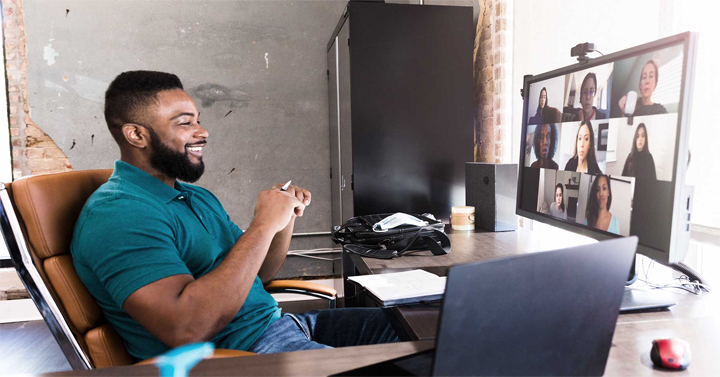What’s the most coveted asset in an office setup besides the boss’s chair or maybe his state-of-the-art coffee vending machine - your own desk space!. Since that’s where all of your genius work gets done, it's obvious you would like to have the best possible working space. Post-pandemic, offices and businesses are adopting newer work models such as hot desking and hoteling that let you choose your desk space to come in and work as and when needed. When it comes to hot desking vs hoteling, there’s plenty of room for confusion since both are booking models.
Read on to understand a little more on what these workspace booking concepts are and hoteling vs hot desking advantages and disadvantages.
1. What is Hot Desking?

Hot desking includes booking of work areas or desk spaces within an office for a specific time period as and when needed. These workspaces are not permanently allocated and are given on a first-come, first-served basis. These bookings can be modified to accommodate last minute changes.
2. What is Hoteling?

Hoteling uses a central schedule to manage and optimise workspaces well in advance. This is usually done for longer time periods on a daily, weekly or monthly basis. This guarantees people have what they need to be happy and productive at work, while still providing flexibility and economies for the organisation.
3. The Advantages and Disadvantages of Hot Desking
3.1 Advantages of Hot Desking
3.1.1 Available on Short Notice
If you figure you need to make a quick dash to the office for a couple of hours, hot desking is a great option since you can reserve a space quickly on short notice. This is especially beneficial for part-timers or freelancers, and employees who are travelling or for those who need to use office facilities like a meeting room for a few hours
3.1.2 Helps in Improving Cleanliness in Workspace
With concepts like minimalism and sustainable living on the rise, hot desking is one way to prevent clutter and promote cleanliness in an office space. Since hot desks need to be vacated at short intervals, there’s no scope for personal belongings, plants, frames and more. With fewer items to clear or work your way through on the desk, it’s also a good way to help clean up for the next occupant. A neat and organized desk space not only looks more professional, it also helps in enhancing productivity and more focus at work
3.1.3 Cost-Effective
When considering the cost benefits of hot desking, there’s a large margin. Besides doing away with the need to set up an office space, hot desking helps minimise spending on maintenance and other overheads, especially if you have long-term rental contracts to honour every month.
A cosharing work model optimises space and is a cost-effective way to buffer the business for those periods when work may slack since you can draw up month-on-month agreements and pay based on actual space utilisation.
3.1.4 Employee Flexibility
The biggest USP of remote work is the flexibility in terms of where you can work from besides flexible hours. Hot desking validates this freedom of choice since employees have the option to turn up at the office as and when required while balancing their own personal schedules. This also goes a long way in promoting accountability and boosting productivity.
3.2 Disadvantages of Hot Desking
3.2.1 Limited Choices
The spaces available are limited in choice so if you were hoping to get a window seat or the one closest to the pantry, you may set yourself up for disappointment when you don’t get the one you preferred. Since hot desking works on short notice and it’s more like a lottery draw, you may instead end up with a desk space that's in a more noisy spot. So if you need to work on that sales presentation or content piece that’s on a tight deadline, hot desking may not guarantee that you can get a Zen-ish spot where you can work.
3.2.2 Security Concerns
While hotdesking encourages collaboration if you are working in teams, it’s not a good idea if the type of work you do is confidential in nature. The risk of data theft or mishandling looms large since you share common work areas. You need to be extra cautious about leaving important paperwork around copiers or printers, and relaying sensitive information on credentials, passwords, or other information where others can be privy to it.
3.2.3 Health and Safety Issues
Since there is increased footfall when it comes to co-sharing the workspace, there’s more risk of exposure to bacteria or germs. On any given day, a hot desk may be utilised by eight to ten people on an average. This needs to be addressed as a check parameter to ensure appropriate hygiene and Covid protocols are put in place so team members can work in a safe and healthy environment.
3.2.4 Lack of Personal Space
With remote work comes the flexibility to work from a place of convenience in most cases for employees. However if the nature of your work requires a hot desking arrangement, then this could be a minus for some team members who prefer to control the environment they work in. This could be as simple as wanting to sit in a quiet spot, setting just the right temperature in the room, ensuring a well-lit work area or adding personal items to give their work space some character. All these are small factors that can make significant impact to an employee’s productivity levels
4. The Advantages and Disadvantages of Hoteling
The success of any co-working space depends on what kind of requirements are there and how employees can benefit. While taking a call between hot desking vs hoteling, make sure to consider both the pros and cons.
4.1 Advantages of Hoteling
4.1.1 Helps in Collaboration
Hoteling is a great way to create highly collaborative workspaces since groups or teams can be seated together in close vicinity to facilitate effective teamwork and communication. This is a good choice for small teams of three to five people who usually work on shared projects and can also work independently when required in comparison to much larger teams that need a bigger space and work in close tandem.
4.1.2 Ensures More Control Over Where You Work
Hoteling in comparison to hot desking gives you more freedom to work around your project planning and execution on a daily basis. Since you have the area reserved for a longer and more fixed period of time, you can schedule your work on a project accordingly knowing your desk is not going anywhere. That sense of security and control helps in staying organised and productive consistently.
4.1.3 Provides Support to Remote Team Members
In the interest of fostering team bonding and unity, hoteling is a win-win to bring in both remote team members and in-office team members together. By reserving a fixed space, remote workers can always come into an office when they have the need to without worrying about finding a comfortable working spot. It also gives them a sense of belonging and promotes the case for a more positive work culture.
4.1.4 Enhanced Productivity
Often in remote setups, it’s common to feel left at the fringes and not really be a part of the bigger picture despite being a team member. Hoteling helps overcome these gaps by providing opportunities to come into the office and collaborate with the others to boost your motivation levels and be more productive. Team members have a chance to stay connected whenever they visit knowing that their reserved spots stay that way.
4.1.5 Gives Ample Flexibility
At the core of hoteling is flexibility that benefits both employees and companies. With dynamic factors such as workforce strength that may upsize or downsize and business goals that may change over a period, hoteling can accommodate these changes conveniently. If the employee strength drops, you can reserve a lesser number and save on costs. If it scales up, you have the option to reserve more work desks. Either way, it’s a win-win.
4.2 Disadvantages of Hoteling
4.2.1 Difficulty in Reserving Place for Large Number of Employees
If your business or nature of work is highly collaboration-intensive and includes a large team, then hoteling is not a wise choice. The amount of desks available specifically for one group is highly dependent on how well in advance you can book all seats. So for larger teams, it would be a better option to rent an entire office space instead.
4.2.2 Less Accommodating to Emergencies at Work
The entire concept of hoteling revolves around booking desk spaces much in advance. This could be a spoke in the wheel when it comes to accomplishing ad-hoc work or sudden work deadlines. If you need a desk on sudden notice, it’s quite unlikely to be ready since in majority of the cases, desks are typically booked well in advance. This could be detrimental in terms of work goals.
4.2.3 Conflict Among Coworkers
Not everyone you work with ends up being your best buddy and while it’s normal to have your favourites, you may not like to end up sitting across someone you would rather ignore. There may be no room for change in seating and this could lead to conflicts at the workplace since hoteling involves reserving spaces for longer durations.
4.2.4 No Personalization
Personalization can be a dark horse when it comes to boosting productivity since it indirectly is known to boost mood levels and motivation. Since the use of desk space is at max limited to a few weeks or months and this is after all a temporary arrangement, employees may not be encouraged to add in their personal items such as plants, photo frames, cuddlies and more. This could be a damper for those who enjoy working in familiar environments or need a bit of comfort in their zones by personalizing their desk spaces.
Conclusion
Down to its simplest terms, hotdesking is more of a book-as-is-available system while hoteling is a reservation based booking system. An organization must consider its long-term vision for the workforce and the kind of work model that it wants to adopt. If the company’s resources are needed to visit an office space for frequent collaboration and meetings, then you know why hot desking doesn't work in such cases. If the work being done can be handled independently and entails shorter deadlines, then hoteling may not be the wise choice since employees can come in for a few hours into an office space. Factors such as rentals, real estate occupancy, space utilization and more need to be evaluated in terms of cost-effectiveness as well to ensure that the chosen desk booking system yields the maximum profitability.
5. FAQs
- What does hoteling mean in office?
Hoteling in an office is the process used by employees to reserve a desk, cubicle or office space based on real-time availability well in advance when coming into the office for using a desktop interface, mobile app or kiosk.
- What is the difference between hot desking vs hoteling
When it comes to comparing hot desking vs hoteling, the primary difference is in booking time frame. While hot desking involves round-the-clock booking of desk spaces for short durations such as a few hours, hoteling involves booking of desk spaces prehand for a longer duration in weeks or even on a monthly basis.
 Interested in Virtual Team Building Events?
Interested in Virtual Team Building Events?





















